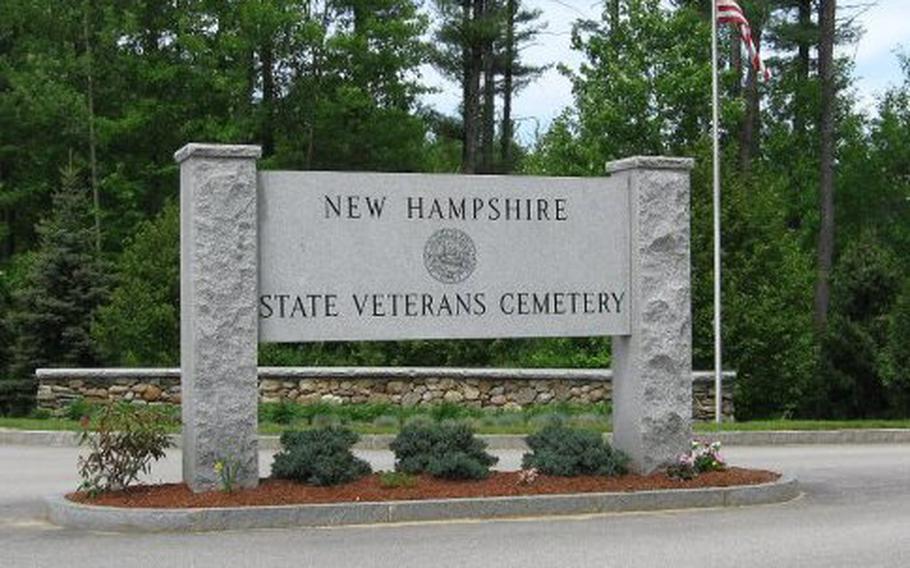
The New Hampshire State Veterans Cemetery in Boscawen, N.H. (Facebook)
(Tribune News Service) — As the state and nation observe Veterans Day this week, veterans advocates and New Hampshire's congressional delegation are pushing for a law change that would allow reservists and National Guardsmen to be buried in state veterans cemeteries.
Currently, under the rules of the federal Department of Veterans Affairs, only members of the Guard and Reserves who have been called to active duty may be buried in cemeteries that receive federal grant funding.
That includes the New Hampshire State Veterans Cemetery in Boscawen.
The Burial Equity for Guards and Reserves Act of 2021 would change that for any service members honorably discharged, as well as anyone who dies "under honorable conditions" while a member of the Reserve Officers' Training Corps (ROTC).
The change also would apply to the members' spouses, and minor or unmarried children.
"It's just doing what's right, and now is the time to do it," the former adjutant general of the New Hampshire National Guard, Maj. Gen. Kenneth Clark, said last week in a conference call hosted by Rep. Chris Pappas, D-N.H.
Pappas, the sponsor of the bipartisan House bill, said the current rules draw an "arbitrary distinction" among those who have served.
"Unfortunately, as a result, the men and women of the Guard and Reserves are being denied the honor of being laid to rest next to their brothers and sisters in arms," he said.
Fight is for fairness
Members of the New Hampshire Air and Army National Guard have deployed multiple times in support of the wars in Iraq and Afghanistan over the past two decades. That federal service would qualify them for burial in the veterans cemetery.
But Guardsmen also have been serving on the front lines of the pandemic here on the homefront, working at vaccination clinics, unemployment centers and the New Hampshire Food Bank. On its own, that service would not make them eligible for burial in Boscawen.
For Anna Thomas, Manchester's public health director, this is a deeply personal matter. "I'm living proof of what this legislation could do for so many Guard and Reservists across the country," she said.
Thomas was in the Army ROTC program at the University of New Hampshire and joined the Army Reserve in Massachusetts. She transferred to the New Hampshire National Guard, serving as operations officer for the state medical command and rising to the rank of major.
After 16 years, she made the difficult decision to leave the military to start her family, she said.
Thomas' father, a veteran, died last year just before Christmas. "We had the honor to lay him to rest at New Hampshire Veterans Cemetery, and it is absolutely sacred ground to us," she said.
"To me, it would be one of the greatest honors to be able to share that burial ground with my father," she said.
Warren Perry, deputy adjutant general of the New Hampshire National Guard, said it's a matter of equity.
"It is about providing an equal opportunity for the members of the reserve components of the United States, both in the National Guard and Reserves, to be recognized and receive the same benefits as their active duty counterparts in terms of interment in our cemetery," he said.
Perry said the proposed law would not force the VA, which administers national cemeteries, to modify its policies for its own cemeteries. It would simply allow state veterans cemeteries to make their own decisions about who is eligible for burial, he said.
Mike Horne, who served as director of the state veterans cemetery from 2008 to 2018, said it broke his heart to have to tell Guardsmen he had served with that they were not eligible to be buried there.
"I believe New Hampshire would move forward in a heartbeat once this legislation would get passed," he said.
NH support solid as granite
The State Veterans Advisory Committee here passed a resolution supporting the change even before the current legislation was proposed, Horne said.
Clark, who retired in 2009, said this idea has been discussed since he was head of the Guard. While some veterans who served on active duty have objected to the change in other places, he doesn't think that will the case here in New Hampshire if the bill passes.
And he said, "I think it's a sad state of affairs that this isn't a change to the V.A. policy that would affect every Reservist and Guardsman in the country."
Horne, the former cemetery director, said that in his experience, some in the V.A.'s National Cemetery Administration who had served on active duty had a "bias" against the Reserve components. "I feel, personally, they really didn't understand the value of the National Guard and Reserves," he said.
But for him, he said, "I feel my service as a Guard for 28 years far exceeded that of me having a job in the Air Force for four years."
Pappas' bill was advanced out of committee late Thursday, setting it up for a vote by the full House.
Rep. Annie Kuster, D-N.H., is a co-sponsor of the House bill. Sen. Jeanne Shaheen has sponsored an identical bill in the Senate, with Sen. Maggie Hassan, D-N.H., and two Republican senators from North Dakota as co-sponsors.
Pappas said passing the measure is "simply the right thing to do."
"Members of our Guard and Reserves have signed up to defend our freedom and our way of life, and I think it's only fitting we defend their ability to be buried where they wish," he said.
(c)2021 The New Hampshire Union Leader (Manchester, N.H.)
Visit The New Hampshire Union Leader (Manchester, N.H.) at www.unionleader.com
Distributed by Tribune Content Agency, LLC.